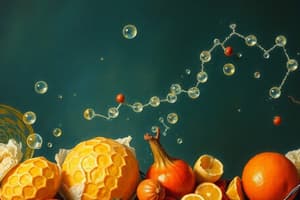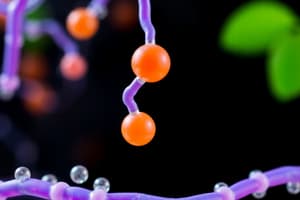Podcast
Questions and Answers
What is the major hexose found in blood?
What is the major hexose found in blood?
- Galactose
- Fructose
- Maltose
- Glucose (correct)
Which type of sugar cannot be digested in the human gastrointestinal tract due to the lack of enzymes that can hydrolyze β-1, 4 linkages?
Which type of sugar cannot be digested in the human gastrointestinal tract due to the lack of enzymes that can hydrolyze β-1, 4 linkages?
- Maltose
- Sucrose
- Cellulose (correct)
- Lactose
What are disaccharides formed by?
What are disaccharides formed by?
- The hydrolysis of two monosaccharides
- The condensation of two monosaccharides (correct)
- The polymerization of two monosaccharides
- The oxidation of two monosaccharides
Which organ is the major site of fructose and galactose metabolism?
Which organ is the major site of fructose and galactose metabolism?
What is the central pathway in the catabolism of all sugars?
What is the central pathway in the catabolism of all sugars?
What occurs during anaerobic glycolysis?
What occurs during anaerobic glycolysis?
What can high concentrations of lactate cause?
What can high concentrations of lactate cause?
What causes lactose intolerance?
What causes lactose intolerance?
What are polysaccharides hydrolyzed by?
What are polysaccharides hydrolyzed by?
What can accumulation of galactose and Galactose 1-phosphate in tissues lead to?
What can accumulation of galactose and Galactose 1-phosphate in tissues lead to?
What are monosaccharides composed of?
What are monosaccharides composed of?
What are polysaccharides?
What are polysaccharides?
What is the major hexose found in blood?
What is the major hexose found in blood?
Which type of sugar cannot be digested in the human gastrointestinal tract due to the lack of enzymes that can hydrolyze β-1, 4 linkages?
Which type of sugar cannot be digested in the human gastrointestinal tract due to the lack of enzymes that can hydrolyze β-1, 4 linkages?
What are disaccharides formed by?
What are disaccharides formed by?
Which organ is the major site of fructose and galactose metabolism?
Which organ is the major site of fructose and galactose metabolism?
What is the central pathway in the catabolism of all sugars?
What is the central pathway in the catabolism of all sugars?
What occurs during anaerobic glycolysis?
What occurs during anaerobic glycolysis?
What can high concentrations of lactate cause?
What can high concentrations of lactate cause?
What causes lactose intolerance?
What causes lactose intolerance?
What are polysaccharides hydrolyzed by?
What are polysaccharides hydrolyzed by?
What can accumulation of galactose and Galactose 1-phosphate in tissues lead to?
What can accumulation of galactose and Galactose 1-phosphate in tissues lead to?
What are monosaccharides composed of?
What are monosaccharides composed of?
What are polysaccharides?
What are polysaccharides?
What are carbohydrates composed of?
What are carbohydrates composed of?
What are monosaccharides?
What are monosaccharides?
What is the major hexose found in blood?
What is the major hexose found in blood?
What are disaccharides formed by?
What are disaccharides formed by?
Why can't cellulose be digested in the human gastrointestinal tract?
Why can't cellulose be digested in the human gastrointestinal tract?
What are dietary polysaccharides hydrolyzed by?
What are dietary polysaccharides hydrolyzed by?
What is the major site of fructose and galactose metabolism?
What is the major site of fructose and galactose metabolism?
What is the central pathway in the catabolism of all sugars?
What is the central pathway in the catabolism of all sugars?
What occurs during anaerobic glycolysis?
What occurs during anaerobic glycolysis?
What can high concentrations of lactate cause?
What can high concentrations of lactate cause?
What causes lactose intolerance?
What causes lactose intolerance?
What is galactosaemia caused by?
What is galactosaemia caused by?
What are carbohydrates composed of?
What are carbohydrates composed of?
What are monosaccharides?
What are monosaccharides?
What is the major hexose found in blood?
What is the major hexose found in blood?
What are carbohydrates composed of?
What are carbohydrates composed of?
What are disaccharides?
What are disaccharides?
What is cellulose?
What is cellulose?
What are monosaccharides?
What are monosaccharides?
What is the major site of fructose and galactose metabolism?
What is the major site of fructose and galactose metabolism?
What is the major hexose found in blood?
What is the major hexose found in blood?
What is glycolysis?
What is glycolysis?
What are disaccharides?
What are disaccharides?
What is anaerobic glycolysis?
What is anaerobic glycolysis?
What is cellulose?
What is cellulose?
What is lactate dehydrogenase?
What is lactate dehydrogenase?
What is the major site of fructose and galactose metabolism?
What is the major site of fructose and galactose metabolism?
What is lactose intolerance?
What is lactose intolerance?
What is glycolysis?
What is glycolysis?
What is galactosaemia?
What is galactosaemia?
What is anaerobic glycolysis?
What is anaerobic glycolysis?
What can galactose and Galactose 1-phosphate accumulation in tissues lead to?
What can galactose and Galactose 1-phosphate accumulation in tissues lead to?
What is lactate dehydrogenase?
What is lactate dehydrogenase?
What is lactose intolerance?
What is lactose intolerance?
What is galactosaemia?
What is galactosaemia?
What can galactose and Galactose 1-phosphate accumulation in tissues lead to?
What can galactose and Galactose 1-phosphate accumulation in tissues lead to?
Flashcards are hidden until you start studying
Study Notes
Carbohydrate Metabolism: Structures, Digestion, and Pathways
- Carbohydrates are compounds composed of C, H, and O, and exist as mono, di, and polysaccharides.
- Monosaccharides are the most commonly occurring sugars and can be aldoses or ketoses.
- Glucose is the major hexose found in blood, while fructose and galactose may appear for short periods depending on dietary intake.
- Disaccharides are formed by the condensation of two monosaccharides, and polysaccharides are polymers of monosaccharide units linked by glycosidic bonds.
- Cellulose, found in plants, cannot be digested in the human gastrointestinal tract due to the lack of enzymes that can hydrolyze β-1, 4 linkages.
- Dietary polysaccharides are hydrolyzed by glycosidase enzymes, releasing glucose, maltose, and smaller polysaccharides.
- The liver is the major site of fructose and galactose metabolism, while all tissues can remove glucose, fructose, and galactose from the blood.
- Glycolysis is the central pathway in the catabolism of all sugars and generates ATP, NADH, building block molecules for anabolism, and useful intermediates for specific cell functions.
- Anaerobic glycolysis occurs when there is inadequate oxygen supply or in cells without mitochondria, and pyruvate is reduced to lactate by lactate dehydrogenase.
- Normally, the amount of lactate produced equals the amount of lactate utilized, but high concentrations can cause lactic acidosis.
- Lactose intolerance is caused by low activity of the enzyme lactase, while galactosaemia is caused by a lack of Galactokinase or Galactose 1-phosphate uridyl transferase.
- Galactose and Galactose 1-phosphate accumulation in tissues can lead to cataracts, glaucoma, and damage to the liver, kidney, and brain.
Carbohydrate Metabolism: Structures, Digestion, and Pathways
- Carbohydrates are compounds composed of C, H, and O, and exist as mono, di, and polysaccharides.
- Monosaccharides are the most commonly occurring sugars and can be aldoses or ketoses.
- Glucose is the major hexose found in blood, while fructose and galactose may appear for short periods depending on dietary intake.
- Disaccharides are formed by the condensation of two monosaccharides, and polysaccharides are polymers of monosaccharide units linked by glycosidic bonds.
- Cellulose, found in plants, cannot be digested in the human gastrointestinal tract due to the lack of enzymes that can hydrolyze β-1, 4 linkages.
- Dietary polysaccharides are hydrolyzed by glycosidase enzymes, releasing glucose, maltose, and smaller polysaccharides.
- The liver is the major site of fructose and galactose metabolism, while all tissues can remove glucose, fructose, and galactose from the blood.
- Glycolysis is the central pathway in the catabolism of all sugars and generates ATP, NADH, building block molecules for anabolism, and useful intermediates for specific cell functions.
- Anaerobic glycolysis occurs when there is inadequate oxygen supply or in cells without mitochondria, and pyruvate is reduced to lactate by lactate dehydrogenase.
- Normally, the amount of lactate produced equals the amount of lactate utilized, but high concentrations can cause lactic acidosis.
- Lactose intolerance is caused by low activity of the enzyme lactase, while galactosaemia is caused by a lack of Galactokinase or Galactose 1-phosphate uridyl transferase.
- Galactose and Galactose 1-phosphate accumulation in tissues can lead to cataracts, glaucoma, and damage to the liver, kidney, and brain.
Studying That Suits You
Use AI to generate personalized quizzes and flashcards to suit your learning preferences.




